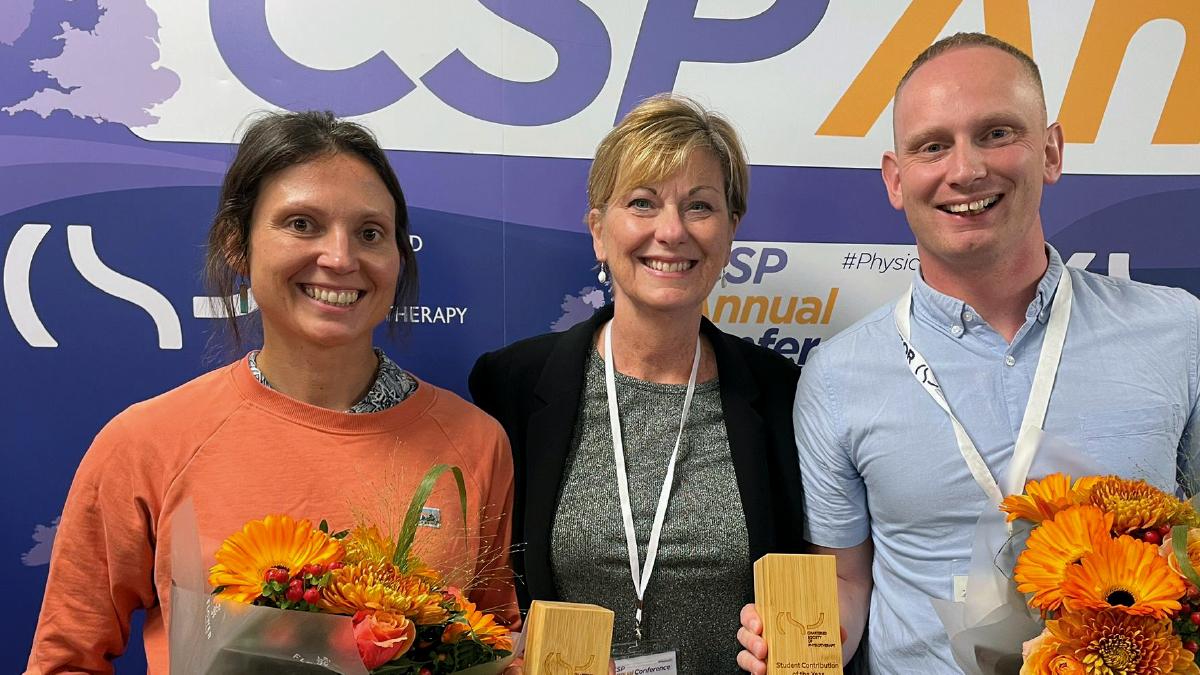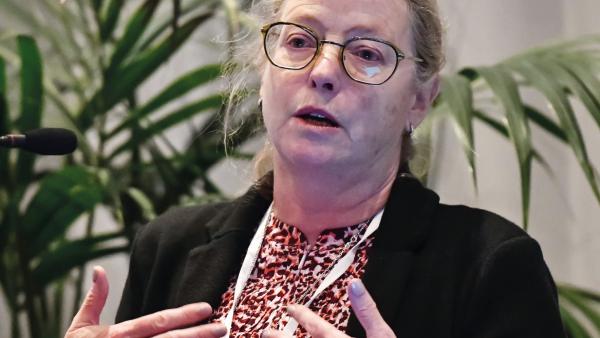The CSP has hosted annual conferences in each of the four UK nations, with both in-person and online events in Belfast, Northern Ireland, Glasgow, Scotland, and Cardiff in Wales. England’s was in Birmingham while our students gathered in London

Physio students kick off CSP annual conference
Physiotherapy students across the UK gathered for the CSP student conference on 24 October which featured more than 20 speakers, with a keynote from chair of CSP Council, Ishmael Beckford, highlighting the significant contributions students have brought to the CSP and wider healthcare community, the challenges many currently face, and the need to further reinforce and develop a space for the student voice.
A series of presentations and panel discussions featuring physiotherapists from a vast array of professional networks followed, introducing students and new graduates to a host of clinical specialisms, opportunities in research careers, and an exploration of contemporary issues in physiotherapy practice and education.
Several awards were presented. The Physiotherapy Research Society awarded prizes for poster presentations created by students. Ola Syczyck from Keele University won first prize for their service evaluation of a collaborative, community-based music-making stroke therapy programme, while Lizzie Evans’ project looking at the link between netball-specific injury prevention and improvements in balance was runner-up.
Wales highlights value of physiotherapy
Physiotherapists from Wales and the UK shared insights on the profession, the latest development in specialist areas and ways in which members can advance their practice by using their influence.
There was an early focus on the value of data to inform decision-making and make the case to health leaders about the value of physiotherapy to patients and the whole health service.
Ruth Crowder, chief allied health professions adviser for the Welsh Government, gave a keynote address.
She said: ‘It’s a really exciting and important opportunity to hear and learn some of the really exciting innovations that physios are undertaking, changing their services, [and] some of the research they have been doing to evidence the kind of work that we need to develop and expand in order to deliver the best outcomes for people.’
Final stop of CSP conference tour
Health inequities and the patients’ perspective of physiotherapy were among the topics considered at the Scottish gathering of CSP members.
They discussed a wide range of topics from facilitating research in practice, to digital advances in care. There was also a lively debate about whether the physio profession is fit for the future.
Dr Cor Hutton, founder of charity Finding your Feet, shared a patient’s perspective of physiotherapy. Cor, a quadruple amputee following sepsis in 2013, was the first Scot to receive a double hand transplant.
She has gone onto achieve many physical feats, including being the first female quadruple amputee to climb Kilimanjaro, and setting up Finding Your Feet – a charity supporting families affected by amputation or limb absence.
She told delegates: ‘I know that physio has helped me get my independence and my self-confidence back.
‘It made me determined to push harder to try to live a positive life, made me able to say “yes” to things I never dreamed possible.’
Delegates heard about an array of work happening within Glasgow and beyond to tackle health inequalities. Physiotherapist and PhD candidate, Cassandra MacGregor’s research looks into how chronic pain services can be delivered in an equitable manner, and how their current delivery may exacerbate existing inequity in a population.
She shared how physiotherapy staff and services can act to tackle health inequalities now:
‘I think that physios can start to take action on health inequalities by asking themselves who benefits the most from their services. What groups of people are attending their services? Who’s actually participating in their services? And then, thinking about in terms of the demographic of area you work in, who is actually benefiting from those services?’
Leadership takes centre stage in Northern Ireland
Physiotherapy professionals from both Northern Ireland and the wider UK came together, facilitating the exchange of insights and best practice spanning various facets of the profession.
Speakers delved into an array of topics, including informatics and encompassing the vital role of effective communication, the evolution of first contact physiotherapy in Northern Ireland, the advancements in MSK practice, and the pathways leading
to personalised patient care.
Renowned sports physiotherapist Professor Phil Glasgow delivered the keynote address with the theme ‘Leadership as practice.’
He told delegates: ‘Practitioners should constantly strive to become the best versions of themselves, a goal that necessitates the support of a strong team.
‘Being an exceptional leader involves a dedicated focus on your objectives and the ability to adapt, recognising that no situation is ever perfect.
‘This is particularly striking when you consider the role rehab can have on reducing re-admission and easing pressure on ambulance responses and A&E.’
Founders Lecture: using the physio workforce to best effect

The role of the physiotherapy workforce in helping address the needs of a fast-changing population took centre stage at the CSP’s conference in Birmingham.
There was an array of inspiring, challenging, and informing presentations from CSP and NHS colleagues on areas such as rehab, prehab and the challenges of using the physio workforce to best effect. On top of this, the challenges posed by changing demographics and health needs was in sharp focus.
It was during the Founders Lecture, delivered by Anita Charlesworth, right, director of research and economics at the Health Foundation, that the details were borne out.
She said: ‘We’ve got an expected 2.5 million more people with major illness over the next 20 years, and lots of those illnesses are going to be things that need the support of physiotherapists.
‘What’s so important, especially when services are under such immediate pressure, is to carve out time to think about how we need to adapt and change so that we’re able to meet patients’ needs not just today but in 10 and 15 years’ time.’
CSP annual conference
The next CSP annual conference is on 10-12 October 2024 in Manchester. The theme will be ‘Rehabilitation transforms population health’. The call for symposium sessions is now open. Submit your proposals here.
Find Out More
Number of subscribers: 1




































